|
|
|
Sort Order |
|
|
|
Items / Page
|
|
|
|
|
|
|
| Srl | Item |
| 1 |
ID:
132326
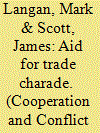

|
|
|
|
|
| Publication |
2014.
|
| Summary/Abstract |
Aid for Trade (AfT) has gained prominence as an innovative form of donor support in the 'post'-Washington Consensus. AfT mechanisms have been praised as a means of aligning trade liberalisation deals (whether in the Doha Round or within bilaterals) to poverty reduction objectives. This article, through critical analysis of AfT discourse within the 'moral economies' of multilateral World Trade Organization and bilateral European Union-African, Caribbean and Pacific negotiations, points to the strategic purposes of donor language in rationalising asymmetric North-South trade systems. Moreover, it questions the 'development' credentials of AfT assistance by examining some of the ensuing private sector activities and the impact on the supposed beneficiaries, and the tying of AfT disbursements to the implementation of inappropriate policies.
|
|
|
|
|
|
|
|
|
|
|
|
|
|
|
|
| 2 |
ID:
132327
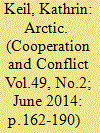

|
|
|
|
|
| Publication |
2014.
|
| Summary/Abstract |
Neorealist and neoliberal institutionalist explanations for the state and future of the Arctic region dominate the Arctic debate in international relations. While both schools focus on different aspects concerning the current and future state of Arctic affairs - neorealism evokes a confrontational rush for the Arctic's resources, whereas neoliberal institutionalism propagates the necessary reform of the institutional system governing Arctic issues - both share the underlying assumption of significant and rising stakes towards Arctic commodities. However, this article argues that this debate has hitherto failed to substantiate the actual stakes of the main actors involved. Consequently, many studies make grandiloquent statements about prospects of cooperation and conflict and the appropriate institutional framework for the Arctic region, based on only limited empirical support. This article aims to fill this gap by analysing the Arctic oil and gas interests of the five Arctic littoral states (Russia, USA, Canada, Norway and Denmark/Greenland). The analysis shows greatly different levels of interests towards the High North among the Arctic states. The findings make it possible to make more credible statements about the likelihood of confrontation over Arctic resources and necessary institutional adjustments. The evidence shows that the often-evoked issue of geopolitical rush for Arctic resources is unlikely to eventuate. Nonetheless, there remain institutional challenges for the protection of the fragile Arctic ecosystem.
|
|
|
|
|
|
|
|
|
|
|
|
|
|
|
|
| 3 |
ID:
132332
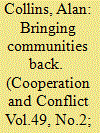

|
|
|
|
|
| Publication |
2014.
|
| Summary/Abstract |
The Association of Southeast Asian Nations (ASEAN) is building a people-oriented community in Southeast Asia and it has all the hallmarks of a Deutschian security community, with its emphasis on people-to-people contact and the involvement of civil society organisations in the community's creation. In this article the argument is made that it is precisely the involvement of the masses that creates the peace inertia associated with security communities, and thus ASEAN's plural turn is an essential first step in making ASEAN's community a security community. Whether ASEAN can actually do this, and indeed whether the membership are united in this objective, is not the focus for this article. Instead, and contrary to the security community literature, which identifies ASEAN as a non-liberal security community and has emphasised the practice of self-restraint, this article argues that past ASEAN practice has prevented a security community forming in Southeast Asia, and using self-restraint as an explanation for why security communities create dependable expectations of peaceful change for members has resulted in the agency of 'community' being neglected. Hence, this article argues for the need to bring 'community' back.
|
|
|
|
|
|
|
|
|
|
|
|
|
|
|
|
| 4 |
ID:
132329
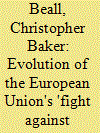

|
|
|
|
|
| Publication |
2014.
|
| Summary/Abstract |
The purpose of this article is to explore the ways in which the European Union (EU)'s counter-terrorism discourse, the 'fight against terrorism', is constructed, and the ways in which it functions both rhetorically and in practice. It argues that 'EU identity' is constituted through and is central to the constitution of EU counter-terrorism policy. The approach taken is constructivist in nature, drawing on a discourse analysis of primarily European Council policy documents, as well as the reports and speeches of the EU Counter-Terrorism Co-ordinator. In particular, it identifies three strands of the discourse that, it is argued, play a key role in the construction of a terrorist 'other'. These three strands include terrorism as crime and as an emotive act of violence; terrorism as an act perpetrated solely by non-state actors; and terrorism as a 'new' and 'evolving' threat. The article proceeds in three steps. First, it outlines the theoretical considerations that underpin this research, including its empirical application. Second, it demonstrates how each strand of the discourse is constructed. Third, it discusses the functioning of the discourse, including the contested nature of the 'terrorism knowledge' that underpins the EU's counter-terrorism approach. The article concludes by reflecting on what this case study contributes to our understanding of EU counter-terrorism policy, as well as explaining how the notion of the terrorist 'other' could provide the basis for a future research agenda that deepens our understanding of how the identity of the EU is constituted.
|
|
|
|
|
|
|
|
|
|
|
|
|
|
|
|
| 5 |
ID:
132330
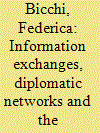

|
|
|
|
|
| Publication |
2014.
|
| Summary/Abstract |
This article analyses how, within the European Union foreign policy system, information is gathered and knowledge is constructed. The analysis is based on the evidence provided by a unique dataset, comprising the Heads of Mission reports between 1998 and 2010 and the EU member states' diplomatic networks. After distinguishing between information and knowledge, the article tackles three related aspects. First, it shows that the EU is able not only to favour information exchanges, but also to gather information and construct knowledge. Second, it argues that, while member states have an interest in contributing their own information and knowledge, European knowledge is also possible. This is demonstrated by means of an in-depth analysis of the preparation of the Heads of Mission report on East Jerusalem. Third, the article suggests that, depending on the reach of their diplomatic network, some member states are interested more than others in European information, but all member states are interested in European knowledge and in each other's interpretation of current affairs
|
|
|
|
|
|
|
|
|
|
|
|
|
|
|
|
| 6 |
ID:
132331
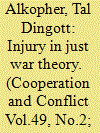

|
|
|
|
|
| Publication |
2014.
|
| Summary/Abstract |
The paper traces the evolution of just war discourse and its historicity. Taking St Augustine's crucial definition of just war as a war to avenge injuries as our starting point, we focus on the concept of injury in 'just war' discourse. The genealogy of the notion of injury is traced through the continuities, ruptures, and leaps in the evolution of its meaning, starting from the conceptualization of just war in medieval thinking to its manifestation in feminist thought. It specifically explores two aspects of the way injury is conceptualized: the meaning ascribed to the actual concept of injury and, secondly, the constructed appropriate reaction to injury. In conclusion, we assess how far injury is indeed socially constructed and try to determine the impact of its socially constructed meaning on just war thinking and possibly warlike practices.
|
|
|
|
|
|
|
|
|
|
|
|
|
|
|
|
| 7 |
ID:
132328
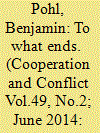

|
|
|
|
|
| Publication |
2014.
|
| Summary/Abstract |
Since the EU's Common Security and Defence Policy framework became operational in 2003, the Union has undertaken more than 20 crisis management operations. The drivers behind this activity remain debated. This article proposes a fresh interpretation based on governmental interests as defined by domestic political risks and opportunities. It argues that EU governments have tailored Common Security and Defence Policy action so as to satisfy domestic audiences. By way of illustration, this article examines the most ambitious Common Security and Defence Policy operation to date, the EU Force mission in Chad and the Central African Republic, as well as a deliberate non-intervention in a comparable case, in the eastern Democratic Republic of Congo in late 2008. By analysing the positions of the most relevant EU governments in each respective case, this article demonstrates how they corresponded to domestic political logic. Drawing on some 20 interviews with policy-makers, this article provides a theoretical account explaining the motives behind Common Security and Defence Policy decision-making rooted in original empirical evidence. The explanation for the haphazard pattern of Common Security and Defence Policy operations thus far can be found in the link between domestic politics and EU crisis management operations.
|
|
|
|
|
|
|
|
|
|
|
|
|
|
|
|
|
|
|
|
|